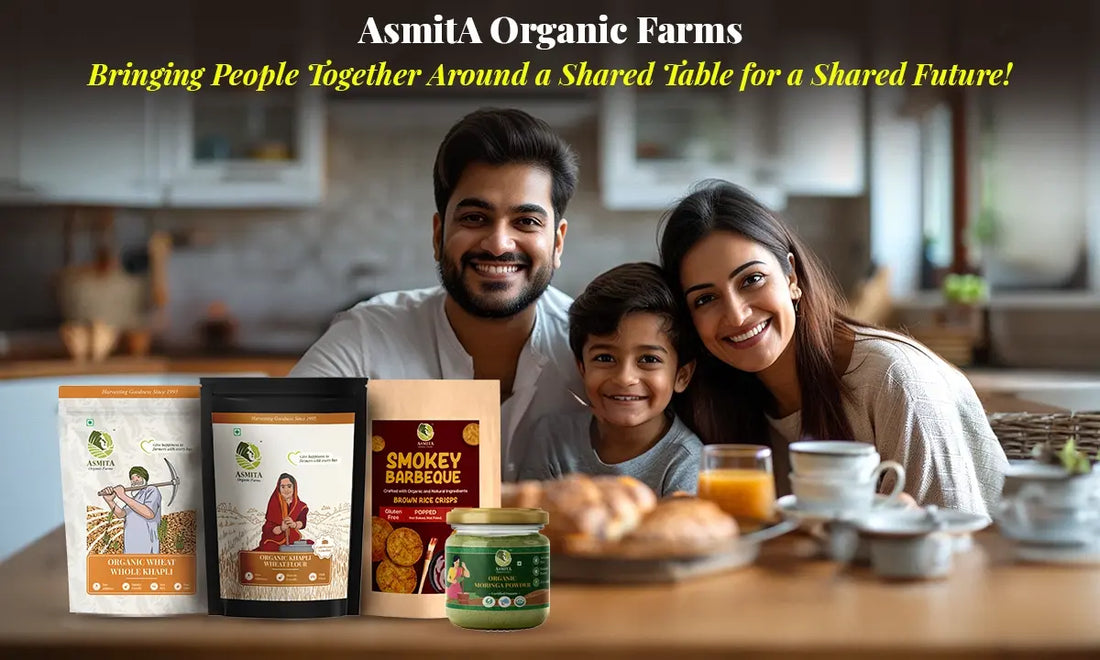Best Organic Brand in India for Health-Conscious People
Info Organic 5 min read
In today's fast-paced world, where we are constantly bombarded with processed foods and synthetic ingredients, finding wholesome and natural options for our diet has become more crucial than ever.
As health-conscious individuals, we are constantly seeking ways to nourish our bodies with the best possible ingredients. This is where organic food brands come into play, offering products that are free from harmful chemicals and pesticides and grown or produced in a sustainable and environmentally friendly manner. If you're on the lookout for the best organic brand in India, you're in the right place.

Table Of Contents:
- Most Promising Organic Food Brand In India
- Demand For Organic Food Products In India
- What Certificates Are Essential For Organic Food Brands In India
- Why Are Organic Food Products More Expensive?
- Conclusion
Most Promising Organic Food Brand In India
Founded in Vidarbha, Maharashtra, AsmitA Organic Farms, one of the best organic brands in India, aims to promote a healthier lifestyle by offering genuinely farm-fresh products. They work with over 2000 small farmers across India, employing traditional and modern farming methods to grow crops without harmful chemicals.
Certified by recognised organic certification bodies like USDA Organic, India Organic, FSSAI, and Jaivik Bharat, their produce meets global organic standards; it is one of the leading organic farming companies in India that provides you nothing but the best quality.
Their eco-friendly practices include crop rotation, organic composting, and integrated pest management to maintain soil fertility and promote biodiversity. They also train local farmers in organic farming techniques, supporting fair trade practices and improving farmers' livelihoods.
AsmitA Organic Farms, one of the best organic foods company in India, offers a diverse range of organic products, including cold-pressed flours, grains, pulses, spices, and dairy products. Each product is carefully cultivated, harvested, and processed to retain its natural flavour and nutritional value, ensuring a healthy and delicious dining experience.
Product Offerings
Grains & Flours:
AsmitA Organic Farms offers various organic cold-pressed flours, such as khapli wheat flour and amaranth flour, along with a wide range of millets, rice, and more in food products.
Spices & Masalas:
Discover a wide range of organic spices and masalas, including turmeric, coriander powder, and chilli powder, Organic Indian Tadka for all your kitchen needs.
Salts & Sweeteners:
Explore organic food products options for your sweet and salty cravings, including jaggery powder, date sugar, palm sugar, coconut sugar, and Himalayan pink salt.
Cold-Pressed Oils & Ghee:
Sourced from grass-fed Gir cows, AsmitA Organic Farms offers nutrient-rich A2 organic ghee, along with a variety of cold-pressed oils such as virgin coconut oil, sunflower oil, olive oil, avocado oil, and groundnut oil.
Superfoods:
Find healthy superfoods like flax seeds, moringa powder, wheatgrass powder, panjiri, black ginger powder, and more to boost your nutrition.
Cereals & Pulses:
Choose from a selection of organic dals (lentils) and pulses such as rajma, toor dal, chana dal, and more.
Ready-to-Eat Snacks:
AsmitA Organic Farms also offers organic food products like instant kheer mixes and ready-to-eat snacks like Panjiri, Brown Rice Crisps, Almond Nut Butters, and more.
Demand For Organic Food Products In India
In the bustling landscape of India's food industry, there's a quiet but powerful movement gaining momentum – the demand for organic food products. This surge isn't just a passing trend; it's a reflection of a fundamental shift in consumer behaviour towards prioritising health, sustainability, and quality.
Nourish The Health With Organic Goodness:
As health-conscious Indians increasingly seek out healthier alternatives, organic brands in India are stepping up to the plate. These brands aren't just selling products; they're cultivating a lifestyle centred around wholesome, chemical-free eating.
From grains to spices, oils to snacks, these food companies are redefining what it means to eat well in today's fast-paced world.
Fueling Growth for Organic Food Companies:
The ripple effect of this food frenzy isn't limited to consumers alone. Indian organic food companies are reaping the benefits of this growing demand.
With a keen focus on delivering authentic, ethically sourced products, these companies are carving out a niche in the market while promoting sustainable farming practices and supporting local communities.
Organic Evolution:
As we gaze into the crystal ball of India's food future, one thing is abundantly clear – the organic revolution is here to stay. With consumers increasingly mindful of what they put on their plates, the organic food industry in India is poised for exponential growth.
It's not just about what we eat; it's about nourishing our bodies, protecting the environment, and fostering a healthier, happier tomorrow for generations to come.
What Certificates Are Essential For Organic Food Brands In India
In the realm of best organic food brands in India, certifications play a pivotal role in assuring consumers of the authenticity and quality of the products they purchase. These certifications serve as a seal of trust, indicating that the food has been produced in compliance with strict standards and regulations. Let's delve into the essential certificates that organic food brands in India must possess to earn the trust of discerning consumers.
India Organic Certification:
The India Organic certification is a hallmark for organic food brands in India, indicating that the products have been grown and processed according to the National Standards for Organic Production (NSOP) set by the Government of India.
This certification of indian organic food companies assures consumers that the food they're purchasing is free from synthetic pesticides, fertilisers, and other harmful chemicals and has been produced using sustainable farming practices.
USDA Organic Certification:
For organic food brands looking to export their products to international markets, the USDA Organic certification is essential. This certification is issued by the United States Department of Agriculture (USDA) and ensures that the products meet the standards set by the USDA's National Organic Program (NOP).
Having this certification opens doors to lucrative export opportunities and enhances the credibility of Indian food brands on the global stage.
Jaivik Bharat Certification:
The Jaivik Bharat certification is another vital accreditation for organic food brands in India.
Endorsed by the Agricultural and Processed Food Products Export Development Authority (APEDA), this certification signifies that the products are compliant with the National Program for Organic Production (NPOP) standards and have been produced through organic farming practices.
It enhances consumer confidence in the authenticity and integrity of organic food products.
FSSAI Certification:
While not specifically an organic certification, the Food Safety and Standards Authority of India (FSSAI) certification is nonetheless crucial for best organic food brands in India.
It ensures that the products comply with food safety standards and regulations, providing consumers with an additional layer of assurance regarding the safety and quality of the food products they consume. It enhances the credibility of Indian organic food brands in India.
Why Are Organic Food Products More Expensive?
While organic food products might seem like the healthier choice, it often comes with a steeper price tag compared to conventionally grown produce. But what exactly makes these food products more expensive? Here's a breakdown of the key factors:
Stricter Production Standards:
Organic farming follows a set of strict guidelines to ensure the health of the soil and the environment. This means no synthetic pesticides, fertilisers, or genetically modified organisms (GMOs) are allowed. These restrictions often require more labour and specialised techniques, which can increase production costs.
Lower Yields:
Conventional farming often relies on the heavy use of fertilisers and pesticides to maximise crop yields. Organic farming, on the other hand, prioritises natural processes, which can sometimes result in lower crop yields. With fewer fruits and vegetables harvested per acre, the cost per unit of organic produce increases.
Longer Shelf Life (Sometimes):
These food products are typically free of preservatives commonly used in conventional farming. While this is a major benefit for health, it can also lead to a shorter shelf life for some products. This means there's a higher chance of spoilage for farmers and retailers, potentially leading to higher prices to compensate for these losses.
Limited Availability:
Organic farming is still a smaller segment of the overall agriculture industry. This limited availability can drive up the price due to simple supply and demand. As the demand for these food products increases, production also increases, which may lead to more competitive pricing in the future.
Certification Costs:
Organic farms need to undergo a rigorous certification process to ensure they meet all the strict standards. These certifications come with associated fees, which can be passed on to consumers through higher product prices.
Conclusion
At AsmitA Organic Farms, our ethos is rooted in transparency and a commitment to quality. We believe in providing Indian consumers with the best organic food products that are both nutritious and sustainable.
As one of the leading and best organic brands in India, we offer a range of high-quality products that nourish our bodies and support a healthier, more sustainable food system. By choosing AsmitA Organic Farms, you are investing in your health and the well-being of our planet. While switching to these kinds of products might require a bit more investment upfront, the long-term benefits for our health and the environment make it worthwhile.

